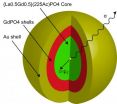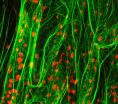(Press-News.org) New research from Karolinska Institutet in Sweden shows that men who take vitamin C supplements regularly run a higher risk of developing kidney stones. The study, which is published in the scientific periodical JAMA Internal Medicine, did not however observe an increased risk between kidney stones and multivitamins – which contain lower concentrations of vitamin C.
The research is based on data from a large population-based study of men from Västmanland and Örebro counties, who were monitored for 11 years. A total of 23,355 men were identified who had no history of kidney stones and who took either no dietary supplements or supplements in the form of vitamin C only. During the study period, 436 of the participants developed kidney stones that required medical attention. The researchers then compared the risk of kidney stones in vitamin C-takers with that in men who did not take any supplements. The analysis was then repeated for men who took multivitamins.
The results of the study indicate that men who take vitamin C supplements (typically 1000 mg per tablet) are twice as likely to develop kidney stones as men who do not take any dietary supplements. The risk was also found to increase with the frequency of vitamin C supplement use. The regular use of multivitamins was not found to be associated with the risk of kidney stones.
The researchers believe that both the dose and combination of nutrients with which the vitamin C is ingested are important. For this reason, the observed increase in risk does not apply to a normal dietary intake of vitamin C from fruit and vegetables. In Sweden, the RDI for vitamin C is 75 mg; the vitamin C content of supplements is commonly 1,000 mg per tablet, which is a considerably higher dose than which is obtained through food.
"As with all research, the results should be corroborated by other studies for us to be really sure," says study leader Agneta Åkesson, Associate Professor at Karolinska Institutet's Institute of Environmental Medicine. "Nor can we say anything about whether women run the same risk as men. But given that there are no well-documented benefits of taking high doses of vitamin C in the form of dietary supplements, the wisest thing might be not to take them at all, especially if you have suffered kidney stones previously."
###
The study was carried out in association with urologists and nephrologists at Karolinska Institutet and Karolinska University Hospital, and was made possible with a grant from the Swedish Research Council and with Karolinska Institutet's KID funding for doctoral education.
Publication: 'Ascorbic acid supplements and kidney stone incidence among men: A prospective study', Laura D K Thomas, Carl-Gustaf Elinder, Hans-Göran Tiselius, Alicja Wolk, Agneta Åkesson, JAMA Internal Medicine, online first publication, 4 January 2013. Embargoed for publication until February 4th, 2013 at 4 p.m. US Eastern Time.
For further information, please contact
Agneta Åkesson, Associate Professor
Institute of Environmental Medicine
Tel: +46 (0)8-542 875 42 or +46 (0)73-6553434
E-post: Agneta.Akesson@ki.se
Laura Thomas, Doctoral Student
Institute of Environmental Medicine
Tel: 46 (0)8-542 864 38
Email: Laura.Thomas@ki.se
Contact the Press Office and download photos: ki.se/pressroom
Karolinska Institutet – a medical university: ki.se/English
Vitamin C supplements linked to kidney stones
2013-02-05
ELSE PRESS RELEASES FROM THIS DATE:
Injection-free vaccination technique could address global vaccine challenge for HIV, malaria
2013-02-05
Scientists at King's College London have demonstrated the ability to deliver a dried live vaccine to the skin without a traditional needle, and shown for the first time that this technique is powerful enough to enable specialised immune cells in the skin to kick-start the immunising properties of the vaccine.
Funded by the Bill & Melinda Gates Foundation and published today in Proceedings of the National Academy of Sciences, researchers say although it is an early study this important technical advance offers a potential solution to the challenges of delivering live ...
Chemical reaction keeps stroke-damaged brain from repairing itself
2013-02-05
LA JOLLA, Calif., February 4, 2013 – Nitric oxide, a gaseous molecule produced in the brain, can damage neurons. When the brain produces too much nitric oxide, it contributes to the severity and progression of stroke and neurodegenerative diseases such as Alzheimer's. Researchers at Sanford-Burnham Medical Research Institute recently discovered that nitric oxide not only damages neurons, it also shuts down the brain's repair mechanisms. Their study was published by the Proceedings of the National Academy of Sciences the week of February 4.
"In this study, we've uncovered ...
Biodiversity exploration in the 3-D era
2013-02-05
Taxonomy – the discipline that defines and names groups of organisms – is a field of science that still employs many of the methods used during the beginnings of the discipline in the 18th century. Despite the increasing use of molecular information to delineate new species, the study of the morphology of specimens remains one of the major tasks of taxonomists. These studies often require first-hand examination of the reference specimens (so-called type material) deposited at museum collections around the globe - a time-consuming and laborious task.
To facilitate this ...
New study finds water tubing-related injuries up 250 percent
2013-02-05
Water tubing, a recreational activity in which participants ride an inner tube which is pulled behind a boat by a tow rope, has grown in popularity in recent years. Unfortunately, the number of injuries related to this activity has also increased.
According to a new study by researchers at the Center for Injury Research and Policy of The Research Institute at Nationwide Children's Hospital, the annual number of water tubing-related injuries increased 250 percent over the 19-year study period, rising from 2,068 injuries in 1991 to 7,216 injuries in 2009. Given that more ...
Finding the way to memory
2013-02-05
Our ability to learn and form new memories is fully dependent on the brain's ability to be plastic – that is to change and adapt according to new experiences and environments. A new study from the Montreal Neurological Institute – The Neuro, McGill University, reveals that DCC, the receptor for a crucial protein in the nervous system known as netrin, plays a key role in regulating the plasticity of nerve cell connections in the brain. The absence of DCC leads to the type of memory loss experienced by Dr. Brenda Milner's famous subject HM. Although HM's memory loss resulted ...
February 2013 story tips from Oak Ridge National Laboratory
2013-02-05
HEALTH – Neutron imaging breast cancer . . .
More precise optical imaging is vital for better diagnosis of breast cancer, which strikes one in eight women annually in the United States alone. Researchers at Oak Ridge National Laboratory and the University of Tennessee are using the neutron imaging beam line at ORNL's High Flux Isotope Reactor to evaluate neutron imaging as a powerful new tool for early detection. The study, led by Dr. Maria Cekanova of UT, working with imaging instrument scientist Hassina Bilheux, is using tissue from dogs treated at the UT College of ...
MU scientists build harness for powerful radiation cancer therapy
2013-02-05
VIDEO:
A new discovery might lead to alpha particle therapy for different types of cancer in the near future.
Click here for more information.
COLUMBIA, Mo. ¬— We've all heard that "it's not wise to use a cannon to kill a mosquito." But what if you could focus the cannon's power to concentrate power into a tiny space? In a new study, University of Missouri researchers have demonstrated the ability to harness powerful radioactive particles and direct them toward small cancer ...
Gene variants found to affect human lifespan
2013-02-05
By broadly comparing the DNA of children to that of elderly people, gene researchers have identified gene variants that influence lifespan, either by raising disease risk or by providing protection from disease.
"This research is the first genome-wide, population-based study of copy number variations in children associated with human longevity," said study leader Hakon Hakonarson, M.D., Ph.D., director of the Center for Applied Genomics at The Children's Hospital of Philadelphia.
The study appeared Jan. 30 in the open-access journal PLOS ONE.
Copy number variations ...
1990s drop in NYC crime not due to CompStat, misdemeanor arrests, study finds
2013-02-05
New York City experienced a historic decline in crime rates during the 1990s, but it was not due to the implementation of CompStat or enhanced enforcement of misdemeanor offenses, according to an analysis by New York University sociologist David Greenberg. The study, which appears in the journal Justice Quarterly, did not find a link between arrests on misdemeanor charges and drops in felonies, such as homicides, robberies, and assaults. In addition, the analysis revealed no significant drop in violent or property crime attributable to the NYPD's introduction of CompStat ...
How plants sense gravity -- a new look at the roles of genetics and the cytoskeleton
2013-02-05
Gravity affects the ecology and evolution of every living organism. In plants, the general response to gravity is well known: their roots respond positively, growing down, into the soil, and their stems respond negatively, growing upward, to reach the sunlight. But how do plants sense gravity and how do they direct or signal their cells to grow in response to it? Although botanists understand a great deal about how this works, a recent article in the recent issue of the American Journal of Botany reviews what we know so far, from mechanical to genetic approaches; it reveals ...



